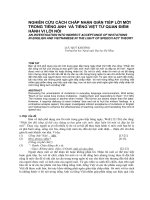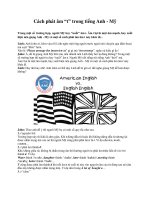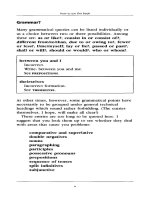Lỗi sai trong tiếng anh 7 ppsx
Bạn đang xem bản rút gọn của tài liệu. Xem và tải ngay bản đầy đủ của tài liệu tại đây (163.69 KB, 6 trang )
ANTENNA
annoint
Wrong spelling.
See
ANOINT.
announce
announced, announcing, announcer, announcement
(not
-n-)
annoy
annoyed,
annoying,
annoyance
(not
anoy
or
annoied)
annul
annulled, annulling, annulment
See
ADDING ENDINGS
(iv).
anoint
(not
-nn-)
anounce
Wrong spelling.
See
ANNOUNCE.
anoy
Wrong spelling.
See
ANNOY.
ante-/anti-
ANTE-
means
before,
antenatal
=
before birth
ANTI-
means
against,
antifreeze
=
against
freezing
antecedent
This
means earlier
in
time
or an
ancestor,
(not
anti-)
See
ANTE-/ANTI
antediluvian
This
means very old-fashioned
and
primitive, literally
'before
the flood of
Noah',
(not
anti-)
See
ANTE-/ANTI
antenna
This
word
has two
plurals, each used
in a
different
sense:
Use
ANTENNAE
to
refer
to
insects.
19
ANTICLIMAX
Use
ANTENNAS
to
refer
to
television aerials.
See
FOREIGN PLURALS.
anticlimax
(not
ante-)
See
ANTE-/ANTI
antidote
See
ANECDOTE
OR
ANTIDOTE?.
antirrhinum
(not
-rh-)
antisocial
(not
ante-)
See
ANTE-/ANTI
anxiety
(not
angs-)
anxious
(not
angs-)
apologise/apologize
Both
spellings
are
correct,
(not
-pp)
apology
apologies (plural)
See
PLURALS
(iii).
apon
Wrong spelling.
See
UPON.
apostrophes
(i)
Apostrophes
can be
used
to
show that letters
have been omitted:
in
contractions
didn't
o'clock
you've
won't
20
APOSTROPHES
in
poetry
o'er
vales
and
hills
where'er
you
walk
in
dialect
'Ere's
'Arry.
in
retail
pick
'n' mix
salt
'n'
vinegar
(ii)
Apostrophes
can be
used
to
show ownership.
Follow
these
simple guidelines
and
you'll never
put
the
apostrophe
in the
wrong place.
Singular
nouns
or
'owners'
The
tail
of the dog
The
dog's tail
Who
'owns'
the
tail?
the dog
Put
the
apostrophe
after
the
owner.
the
dog'
Add
-s. the
dog's
Add
what
is
'owned'.
the
dog's
tail
The
smile
of the
princess
The
princess's smile
Who
'owns'
the
smile?
the
princess
Put
the
apostrophe
after
the
owner.
the
princess'
Add
-s. the
princess's
Add
what
is
'owned'.
the
princess's smile
With
proper
names ending
in -s, you
have
a
choice,
depending upon
how the
name
is
pronounced.
Keats'
poetry
or
Keats's
poetry
But St
James's
Square,
London,
SW1
St
James'
(two syllables)
St
James's (three syllables)
21
APPAL
Plural
nouns
or
'owners'
Don't worry about whether
you use 's or s' in the
plural.
It
will sort
itself
out.
The
tails
of the
dogs
The
dogs' tails
Who
'owns'
the
tails?
the
dogs
Put
the
apostrophe
after
the
owners.
the
dogs'
Add
-s if
there isn't one.
(no
need here)
Add
what
is
'owned'.
the
dogs' tails
The
laughter
of the
women
The
women's laughter
Who
'owns'
the
laughter?
the
women
Put
the
apostrophe
after
the
owners.
the
women'
Add
-s if
there isn't one.
the
women's
Add
what
is
'owned'.
the
women's laughter
And
so,
when reading,
you
will
be
able
to
distinguish
singular
and
plural
'owners'.
The
princess's
suitors.
The
princesses' suitors.
The
'owner'
is the
word before
the
apostrophe.
(iii)
Apostrophes
are
also used
in
condensed
expressions
of
time.
The
work
of a
moment.
A
moment's work.
The
work
of
three years.
Three years' work.
If
you
follow
the
guidelines
in
(ii) above,
you
will never make
a
mistake.
appal
appalled, appalling (not
-aul-)
See
also
ADDING ENDINGS
(iv).
22
appearance
(not
-ence)
appendix
This
word
has two
plurals, each used
in a
different
sense.
Use
APPENDIXES
in an
anatomical sense.
Use
APPENDICES
when referring
to
supplementary
sections
in
books
or
formal documents.
See
also
FOREIGN PLURALS.
appologiseMze
Wrong spelling.
See
APOLOGISE/APOLOGIZE.
appology
Wrong
spelling.
See
APOLOGY.
appraise
or
apprise?
To
APPRAISE
is to
evaluate.
To
APPRISE
is to
inform.
appreciate
There
are
three distinct meanings
of
this
word.
I
APPRECIATE
your
kindness
(=
recognise
gratefully).
I
APPRECIATE
that
you
have
had a
difficult
time
lately
(=
understand).
My
cottage
HAS
APPRECIATED
in
value already
(=
increased).
Some
people
would choose
to
avoid
the
second
use
above (understand, realise)
but the
verb
is now
widely used
in
this sense
and
this
has
become
acceptable.
approach
approached, approaching
(not apr-)
aquaint
Wrong
spelling.
See
ACQUAINT.
23
AOUAINT
AQUAINTANCE
aquaintance
Wrong spelling.
See
ACQUAINTANCE.
aquarium
(singular) aquaria
or
aquariums (plural)
See
FOREIGN PLURALS.
aquiesce
Wrong spelling.
See
ACQUIESCE.
aquiescence
Wrong spelling.
See
ACQUIESCENCE.
aquire
Wrong spelling.
See
ACQUIRE.
arange
Wrong spelling.
See
ARRANGE.
arbiter
or
arbitrator?
An
ARBITER
is a
judge
or
someone with decisive
influence
(an
arbiter
of
fashion).
In
addition,
an
ARBITER
may
intervene
to
settle
a
dispute (-er).
An
ARBITRATOR
is
someone
who is
officially
appointed
to
judge
the
rights
and
wrongs
of a
dispute
(-or).
arbitrator
or
mediator?
An
ARBITRATOR
reaches
a
judgement
but is not
necessarily obeyed.
A
MEDIATOR
attempts
to
bring
two
opposing sides
together
and to
settle
a
dispute.
archipelago
There
are two
interchangeable plural forms:
archipelagoes, archipelagos.
arctic
(not
artic, although frequently mispronounced
as
such)
24









